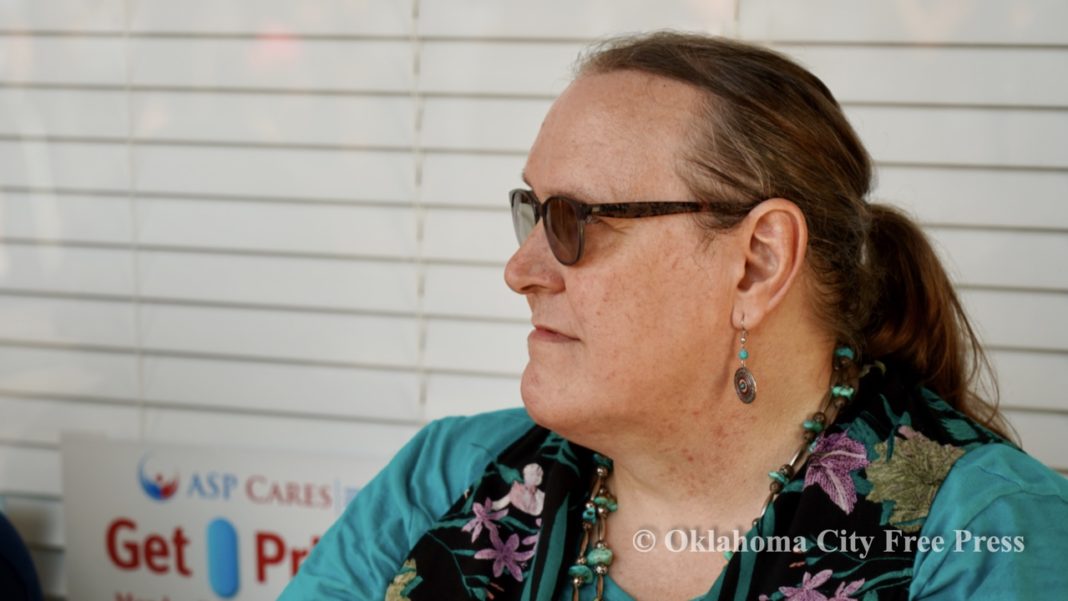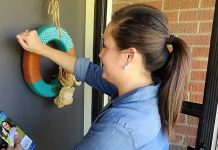Last Updated on January 5, 2024, 12:57 AM | Published: March 19, 2021
Paula Sophia Schonauer, LCSW, continues a serial memoir with this second installment. If you haven’t read the first part of this series take a look: Manhood, from the inside out — Memoir and Mythology
At the age of four, I got out of bed after Mom and Dad left the house for the daily drive to Dad’s place of work. I snuck into the bathroom of our Windsor Street home in Cuyahoga Falls, Ohio, a little red house with no ornamentation and a steep gabled roof.
Mom often left her scarves and cosmetics on the back of the toilet tank, and I ferreted out a tube of lipstick and one of her scarves, a triangle-shaped cloth with tie strings.
Dad had placed a step stool beneath the twist of pipe at the bottom of the bathroom sink, and I dragged it forward to stand upon, just tall enough to see my face in the mirror. I placed the scarf over my short hair, tied the strings the best I could beneath my chin, and applied lipstick with a trembling hand, listening for car noise in the driveway outside.
I stared at my reflection in the mirror, deep into my blue eyes, at my red-smeared lips, and asked, “Why am I me?”
The question had more to do about being a boy than about existential angst. I was already aware I was a boy in a pragmatic sense, mostly because my parents told me I was a boy. Mom dressed me in boy clothes, and Dad took me to get haircuts, my hair short like other boys.
I had a curiosity, though, about the possibility of becoming a girl if I wore a dress, makeup, or perfume. So, when I put on the scarf and lipstick, I half expected to become a girl, magically transformed right there, but it did not happen.
Maybe, I wasn’t good enough with makeup. Perhaps, I should have been wearing a dress, or I should have already had long hair. Then, I realized I couldn’t be a girl until I had long hair, but Dad kept taking me to the barbershop.
When I saw girls with long hair, I was overwhelmed with envy. All the things they could do with their hair: ponytails, braids, berets, bows, tiaras, hats, or just down – hair glistening in the sun, blowing in the wind, flying free and glistening like a benevolent apparition. I knew if my hair had been long, it would have opened my spirit to show the world who I should have been.
I didn’t hear the family car in the driveway nor the slam of car doors. I did hear the front door of our small house open, and I heard voices, loud and bickering. I recognized Mom’s voice, but the other one was harder to place, low and growling, mean.
I snatched the scarf from my head and ran back into the bedroom where my baby brother had awoken and was standing in the crib crying. I dashed beneath my bed and scooted to the wall, trying to become a part of the gloom, unseen and silent. A woman’s feet padded into the bedroom, shod in white sneakers, Mom. She stood in front of my brother’s crib and lifted him out of his small enclosure. He immediately stopped crying, but it didn’t last long.
A sudden bang down the hall startled me, and my brother started crying again. Mom shrieked in fear, dropped my brother back into the crib and ran out of the bedroom.
At this point, the lipstick felt like it was burning my lips, my whole face hot, my head swirling in shame. The sudden chaos was my fault because I had done something wrong. Hiding beneath the bed wasn’t going to save me; Mom had found me there before. So, I stuck my head out to look down the hall, another crashing noise in the kitchen, my brother screaming louder, Mom pleading, “Stop! Please stop!”
I wiped my mouth only to smear red all over my arm, and I snuck down the hall, trying to be as quiet and small as possible. I managed a look into the kitchen, and I saw a man, someone dressed like Dad, throwing a bottle of milk to the floor.
The glass shattered, and a curtain of white liquid splashed across the room. “Pampers! What’s wrong with cloth diapers?” the man yelled. “That’s why we’re broke and can’t fix the goddamn car!”
I ran into the living room, rounded the corner to the stairs, and bounded upward to one of the attic rooms, the one with boxes stacked above Dad’s height. The upstairs room had a sloped ceiling on two sides and one window high on the back wall. I darted into the maze of boxes, going back as far as I could until I found a little door at the entrance of a kid-sized closet, something I heard Dad call a cubby-hole. The door had a tiny, oval-shaped door knob, and I twisted and pulled, revealing a gaping rectangle of darkness.
The darkness was scary at first, seeming almost alive and swirling before my eyes. I expected a tendril of gloom to extend outward to entice me to enter. I heard more yelling downstairs, felt the heat on my lips, the shame on my cheeks, and darted inside the enclosure. It was just tall enough to let me stand at full height, a world, perhaps, made just for me.
I peered down the length of the cubby-hole, nothing but me inside, a floor, two walls, and a sloped ceiling. I closed the door behind me, sealing myself in the warm darkness, soothing and quiet. I ventured deep into the cubby-hole, taking several steps until I reached the back wall before turning around, arms out to feel the boundaries of my new world.
I sat cross-legged for a long time, back against the wall, reveling in the dreamy space between wakefulness and slumber, opening and closing my eyes and seeing nothing but black either way. The warmth turned into heat, and sweat dripped down my face, the air heavy, making it harder to breathe.
I was thirsty and groped toward the door. However, when I pushed against it, I discovered the door could not be opened from the inside.
[Watch for the next part in this serial memoir next week!]
Guest Columnist Paula Sophia is a licensed clinical social worker in Oklahoma City and a former Oklahoma City Police Officer.







